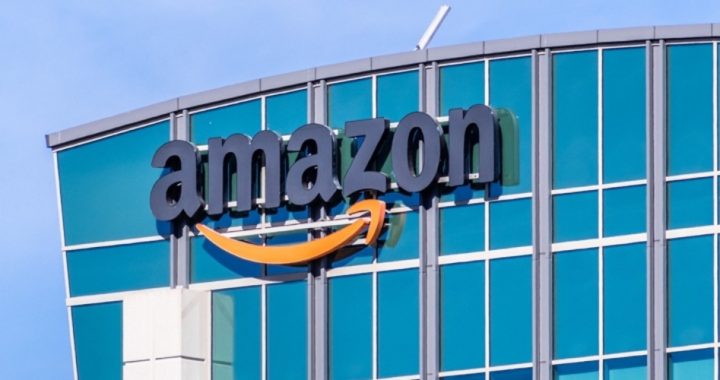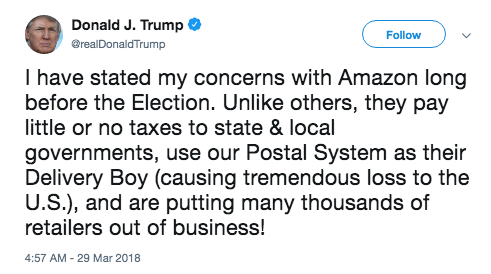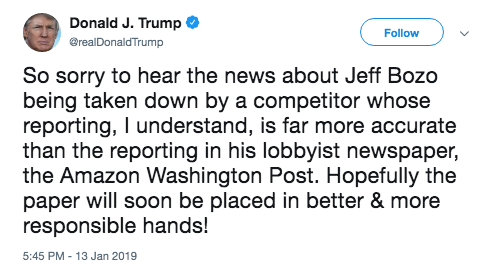
Amazon is on the verge of assuming a major role in America’s national security, but the multinational corporation first has some questions to answer.
Judge Eric Bruggink of the Court of Federal Claims scheduled oral arguments for a bid on the Department of Defense’s $10 billion JEDI cloud computing contract this week, stalling a likely win for Amazon amid conflict of interest accusations.
The arguments, scheduled for July, are a response to a U.S. Court of Federal Claims complaint filed by Oracle, which is also bidding for the Joint Enterprise Defense Infrastructure (JEDI) contract.
The JEDI program will place hosting and distribution of mission-critical information to military personnel in the hands of a single cloud service provider.
In its complaint, Oracle claims defense information would be safer if JEDI employed more than one cloud service. The company alleges that the Pentagon went with the one-provider model due to insider dealings involving Amazon employee and former DoD official Deap Ubhi.
As detailed in the complaint, Ubhi worked at Amazon prior to joining the DoD in August 2016. He is now back at Amazon, specifically at Amazon Web Services (AWS), the cloud computing entity that would be in charge of JEDI should Amazon win the contract.
According to Oracle, Ubhi was a project manager for JEDI and was instrumental in convincing the Pentagon to use a single vendor for cloud computing—going against recommendations by the Department of Homeland Security and Intelligence Community to use multiple cloud vendors.
In fact, the DoD’s own “Cloud Strategy” from last year called for a “multi-cloud, multi-vendor strategy.”
A report by the House Appropriations Committee expressed concern with the single-vendor plan, stating that “this approach may lock the Department of Defense into a single provider for potentially as long as ten years.”
The DoD denied claims that its decision was influenced by Ubhi or Amazon. Department spokeswoman Heather Babb said JEDI “is one component of the larger, multicloud environment.”
Moreover, a Tuesday court filing by the DoD argued that using a single vendor for JEDI would not only save money, but better ensure national security because having multiple cloud vendors would “create seams between clouds that increase security risks.”
But Oracle asserts that Ubhi had secret negotiations about returning to work at AWS while working on JEDI. The company says Slack messages prove that, contrary to the DoD’s court filing, the final decision to use a single vendor had already been made before Ubhi’s departure.
“Everybody knew it was Amazon,” a competing bidder, who wished to remain anonymous, told Vanity Fair.
AWS countered Oracle’s claims by saying that the DoD’s single-vendor approach is “mandated” by federal regulations and based on “detailed factual findings regarding national security and technological complexity.”
But Ubhi’s case isn’t the only one raising questions about the relationship between Amazon and the Pentagon.
Anthony DeMartino worked as a consultant for AWS before joining the DoD in January 2017. Oracle claims the Pentagon’s Standards of Conduct Office (SOCO) ordered DeMartino to recuse himself from JEDI in April 2018, which he ultimately did after JEDI proposal requests had already gone out to bidders.
DeMartino also allegedly ignored a SOCO direction in April 2017 to refrain from participating in anything AWS-related. He now works at Pallas Advisors, which he co-founded with Sally Donnelly — who served as an aide to former Secretary of Defense James Mattis and consulted for AWS through her company SBD Advisors.
Mattis himself is the object of scrutiny due to a meeting he had with Amazon Vice President Teresa Carlson in March 2017 — a meeting the DoD kept secret.
Mattis also met with Amazon founder-chairman-CEO Jeff Bezos in August 2017—a month before the Pentagon began major market research into JEDI.
According to the JEDI Contracting Officer, a July 2018 review of Ubhi and four other AWS-linked government employees showed they did not “negatively impact the integrity of the JEDI procurement.”
In February of this year, the DOD said they were taking another look at Ubhi, but ultimately concluded in April that they found “no negative impact that resulted from any conflicts of interest.”
Due to the oral arguments scheduled by Judge Brugink, the DoD may not award the contract before July 19.
If Amazon wins, it wouldn’t be the first time it has received a major government contract.
The company already has a $600 million cloud computing contract with the CIA, awarded in 2013. That deal made Amazon the federal leader in cloud computing.
And Ring, an Amazon product that functions as combined doorbell-security camera for homes, is now being used by more than 50 police departments across America to develop city-wide surveillance networks.
“Our township is now entirely covered by cameras,” said Captain Vincent Kerney of the Bloomfield Police Department in New Jersey. “Every area of town we have, there are some Ring cameras.”
Despite the allegedly close relationship between the federal government and Amazon, President Trump has repeatedly spoken out against both the online retailer and Bezos himself.
The president has taken aim at Amazon for allegedly gaming the U.S. Postal Service, putting brick-and-mortar retailers out of business, and evading taxes.
President Trump has also expressed disdain for the Bezos-owned Washington Post, whose coverage is often perceived as having a markedly liberal, anti-Trump slant.
Amazon, like fellow tech companies Facebook, Twitter, YouTube, and PayPal, has been accused of censorship against right-wing voices for banning books critical of Islam.
Will the president intervene in the JEDI contract? A source close to the matter revealed that President Trump is aware of the issue and disapproves of the deal.
“From the beginning, the president has been very uncomfortable and unhappy about what appears to be nothing more than a cronyist giveaway to Amazon and Bezos, and after watching last week’s segment on Tucker Carlson, that unhappiness has only risen,” a GOP donor with White House ties told Breitbart News.
As government entities at all levels look poised to increasingly rely on Amazon, Americans will have to ask themselves whether they can trust Jeff Bezos and his company with our most sensitive national security data.
Photo: Andrei Stanescu/iStock Editorial/Getty Images Plus






